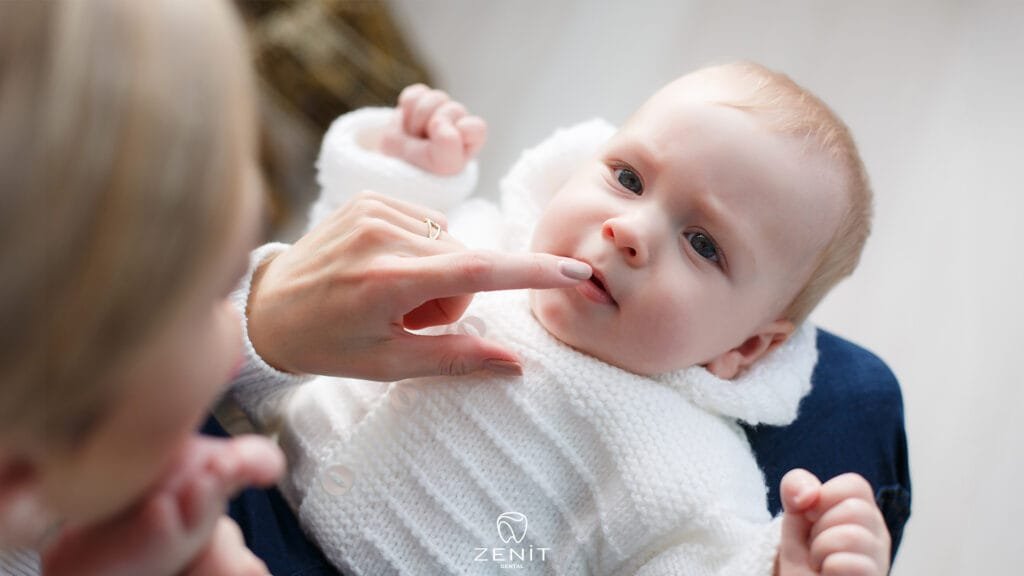Bad Breath in Babies
For parents, their baby’s health, peace of mind, and happiness are paramount. Even the slightest change in their daily routine can cause them anxiety. One of these small but striking details is bad breath in babies. Many parents, upon noticing a different odor emanating from their little ones’ breath, wonder, “Is it normal, or is it a sign of a health problem?”
Naturally, babies’ breath is clean, often with a sweet, milky scent. However, in some cases, this fresh breath can be replaced by an unpleasant odor. While this can be alarming for parents, bad breath isn’t always a sign of a serious problem. It’s often temporary and easily resolved. However, in some cases, it can also be a sign of underlying health issues that require more attention.
Is Bad Breath Normal in Babies?
Bad breath is generally not considered normal in newborns or babies just a few months old. During this period, babies are fed exclusively breast milk or formula. Their diet is quite simple, and their digestive systems are not yet very complex. Therefore, bad breath is not expected in this age group. It is important for parents to be vigilant and try to identify the source of the odor when they notice such a condition.
As babies grow, bad breath becomes more common, especially during teething or when solid foods are introduced. This is because saliva flow changes as new teeth begin to appear in the mouth, and sometimes minor inflammations can occur. During solid food periods, the variety of foods a baby eats can leave food particles in the mouth, which can cause bad breath.

The key point here is whether the odor is permanent or temporary. For example, your baby may emit a distinct odor through breast milk after a garlicky or spicy meal. This is usually a temporary condition that quickly resolves. However, bad breath that persists for days or even weeks is not normal. It could be due to a more serious underlying cause, especially if it’s accompanied by other symptoms such as fever, cough, nasal congestion, vomiting, irritability, or loss of appetite.
Causes of Bad Breath in Babies
Baby bad breath often has simple causes. However, knowing these causes can prevent unnecessary worry and provide early detection in critical situations. Here are the most common causes of bad breath in babies:
Dry Mouth
Babies’ saliva production can decrease, especially during sleep, when they suck on a pacifier for extended periods, or when they sleep with their mouths open. However, saliva is a natural preservative and cleanser that prevents the growth of bacteria in the mouth. When not produced adequately, bacteria multiply rapidly, which can lead to bad breath.
Pacifier and Bottle Use
Because pacifiers and bottle nipples are used frequently, they require extra care in hygiene. If not cleaned thoroughly, bacteria can accumulate on them. This bacteria, when transferred to the baby’s mouth, creates an unpleasant odor. Therefore, it is very important to clean pacifiers and bottles regularly by boiling or properly sterilizing them.
Teething
Teething is a challenging time for babies. During this time, gum tenderness and sometimes inflammation can occur. There’s also an increase in salivation. All of these changes can cause a slight bad breath in babies. It’s also important to maintain good oral hygiene as teeth emerge, as food particles on the newly emerging teeth can cause bad breath.

Diet
Small residue left in the mouth after breastfeeding, formula, or solid foods can cause bad breath. Especially in babies who are starting solid foods, garlic, onions, or spicy foods, whether ingested through breast milk or directly, can cause bad breath. Therefore, it is beneficial to clean the baby’s mouth after feeding.
Oral and Dental Health Problems
While many parents believe that babies are immune to tooth decay, this is not true. Cavities, gum inflammation, or mouth sores can occur after teeth appear. All of these conditions are among the most significant causes of bad breath. Early attention to babies’ oral and dental health can prevent future problems.
Upper Respiratory Tract Infections
Upper respiratory tract problems such as colds, the flu, sinusitis, or postnasal drip can also cause bad breath in babies. Dry mouth and bad breath become more pronounced, especially in babies with nasal congestion, as mouth breathing increases.
Digestive System Problems
Reflux can cause stomach acid to rise upward, which can be the source of bad breath. Some digestive disorders can also cause changes in a baby’s breath odor. In such cases, medical attention is crucial.
How to Get Rid of Bad Breath in Babies
When you notice bad breath in babies, before panicking, it may be helpful to take these simple precautions:
- Pay attention to cleaning pacifiers and baby bottles. They should be disinfected by boiling them or using appropriate cleaning methods.
- Start a dental hygiene habit early. When the first tooth appears, gently clean the teeth and gums with a soft toothbrush or a clean cloth.
- Prevent dry mouth. Make sure your baby is drinking enough fluids, especially in hot weather.
- Clean the mouth after feedings. For babies receiving solid foods, offering water or mouthwash is helpful.
- Try to relieve nasal congestion. Saline drops can help clear the nose.

When Should You See a Doctor?
While not every bad breath is cause for concern, certain symptoms warrant a doctor’s attention. For example, if the bad breath persists for a long time and home remedies are ineffective, if your baby’s breath has a strong odor like rotten eggs or acetone, or if it’s accompanied by fever, loss of appetite, weight loss, or restlessness, caution is warranted.
Furthermore, tooth decay, oral ulcers or inflammation, or one-sided nasal discharge, congestion, or bleeding can be signs of more serious health problems. In such cases, it’s best to consult a pediatrician or pediatric dentist without delay.





